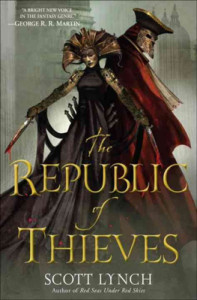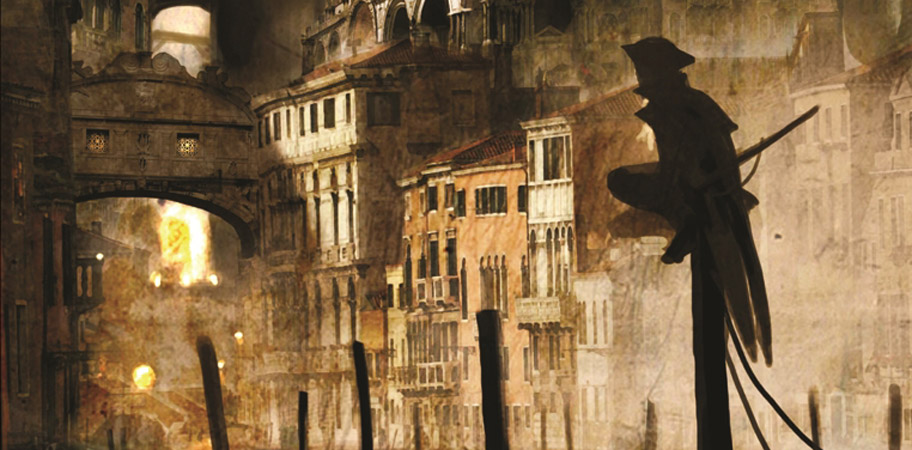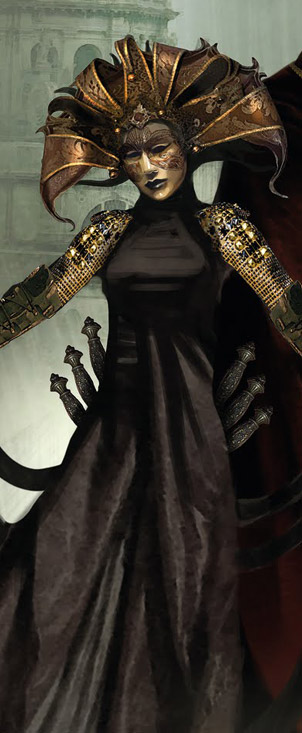
I can remove the poison from your body.
Poison kills. Locke Lamora knows this—poison courses through his veins, eating away his health, wasting away at his mind. Poison is killing Locke Lamora, but at what cost can it be removed from his body, and can even that be considered salvation? The Republic of Thieves, the long-awaited third volume in Scott Lynch’s Gentlemen Bastards series, answers those questions, but, as any good middle-volume should, it asks so many more.
Scott Lynch emerged onto the fantasy scene as an intense, bright-burning star. Almost overnight, he became one of the most exciting young novelists when he released his debut novel, The Lies of Locke Lamora, which engaged readers with its wit, intricate plotting, mile-a-minute dialogue and characters you knew immediately upon meeting them. It was one of the most impressive debut novels of the twenty first-century. And, as luck would have it, the sequel was just around the corner. Lynch promised a book-a-year, and delivered Red Seas Under Red Skies on that schedule. The Republic of Thieves was next on the list. That was six years ago.
Wit, intricate plotting, mile-a-minute dialogue and characters you knew immediately upon meeting them.
It’s difficult for an artist to communicate to a non-artist just how hopelessly tangled the line between their life and their art can become. Even artists who are working in day jobs, however dull and rote they might be, are defined, in so many ways, by their after hours projects—those hobbies and artistic ventures that allow them to deal with the pent up creative energy, or, when times are difficult, to help excise any demons that haunt them.
Scott Lynch has written openly and honestly about his battle with depression and the effect that it has had on his productivity as a writer. The Lies of Locke Lamora and Red Seas Under Red Skies were written in a bubble, a creative outlet while Lynch was still a hobbyist writer. No fans. No expectations. No pressure. The Republic of Thieves was written with the world watching.
In light of Lynch’s personal struggles, these delays were understandable (and, frankly, necessary to give him the time he needed to get healthy), but, while I believe any kind-hearted reader would always choose an author’s health over a new book, it did not lessen the rabid expectations that fans continued to heap on the book. Like the legend of Sabetha Belacoros, the continued absence of The Republic of Thieves began to take on a life of its own as rabid speculation (about the book’s plot, but also, perhaps unfairly, its potential quality) flooded online discussion. Passion pours through, and excitement for Lynch’s third novel never faded despite the various delays. If anything, it grew only more fervent after the releases of The Wise Man’s Fear and A Dance with Dragons, two other long-delayed novels that were met with lukewarm critical receptions.

“I can’t name the poison that’s killing your friend. But the one that’s killing you is called hope.”
It’s not my place to project or prognosticate about how this tumultuous time in Lynch’s life affected the novel he was writing (though Lynch has indicated that he rewrote nearly half of the novel after becoming healthy enough to write again), but it is interesting to note that where The Lies of Locke Lamora and Red Seas Under Red Skies were about Locke Lamora’s infallible perfection, The Republic of Thieves is very much about his flaws, the weaknesses that illustrate his humanity.
In an interview with Suvudu, Lynch said, “it took years to put the pieces of my life reasonably back together. Even once that process was underway, I had to take the complete-but-outdated text of Republic and rewrite nearly half of it. The guy that went into the book is not the same guy that came out the other end, and the version of the story I’d finished in, say, 2010 isn’t anything I’d be proud of now.” If you look closely at Locke, and squint just right, you can might be able to see the author through the thin veneer of his lead character. Every author is present in their novels, in their characters, but the circumstances under which The Republic of Thieves was written presents another angle, another facet, to the autobiographical nature present in fiction. This new vulnerable Locke Lamora is infinitely more engaging and finely crafted than his (already impressive) predecessor. It takes strength to overcome poisonous depression, something Locke is on the verge of sinking into as the novel opens, and that strength shines through in the qualities of Locke’s friends and companions as they keep him afloat during a hopeless time in his life.
“A job?” Locke laughed, then broke into more painful-sounding coughs. “A job? I hope you need someone to line a casket for you, you poor Karthani witch, because that’s the only job I’m presently qualified for.”
“Until you lose the strength for sarcasm, Locke, I wouldn’t hire any mourners.”
p. 97

In 2012, I wrote an essay about A Dance with Dragons and the heavy weight of expectations that made it nearly impossible for the fifth volume of A Song of Ice and Fire to live up to the monumental hype that preceded it. By their nature, middle-volumes are difficult to judge in a vacuum—they have no beginning, they have no end—but they’re hotly anticipated by readers who expect to be filled with the same sense of wonder, excitement and enjoyment as when they first discovered the series. When they fail to do so (which is often, because the beginning of a story presents wonder, the end of a story presents change and resolution, but the middle only presents more problems and small, temporary solutions), they are judged as being inadequate, rather than being analyzed for their successes over the challenges posed by their transitional nature and necessary place in the overall series structure. The Republic of Thieves meets these challenges by shifting course from the formula seen in its predecessors, and succeeds in doing so by using familiar and likeable character to tell a new kind of story. Though it retains Lynch’s trademark parallel storyline-structure, The Republic of Thieves is a much more intimate and character-drive novel than the two before it, allowing the series to mature from back-to-back-to-back heist-style one-off plots to a more layered and satisfying epic.
In many ways, this mountain of expectation is a direct parallel to Sabetha Belacoros, first introduced (but not met by reader) in The Lies of Locke Lamora, whose near-legendary status in the eyes of Locke, Jean, and the rest of the Gentlemen Bastards, is at a level that is nearly impossible live up to in reality. Legends grow in the telling, and there is an underlying perception throughout The Republic of Thieves that Sabetha is not quite what she appears through the rose-tinted glasses of Locke Lamora’s infatuation. Like all legends, the real thing was bound to disappoint, but, as proof of Lynch’s masterful characterization, Sabetha surprises and delights in unexpected ways, mostly by dodging around obvious expectations and being something different than expected.
She’s smart and delightfully twisted […] but, after everything is out on the table, she’s also fallible, flawed and frustrating.
After spending two novels building suspense for Sabetha’s eventual appearance, Lynch wrote himself into something of a corner by requiring a character that would challenge Locke Lamora, one of fantasy’s all stars, as The Republic of Thieves most compelling piece. Instead, Sabetha Belacoros is, well… ordinary. Yes, she’s smart and delightfully twisted in her scheming (she is, after all, inspiration and adversary for Locke Lamora), but, after everything is out on the table, she’s also fallible, flawed and frustrating as anyone else in the novel. With sky high anticipation for her introduction threatening to come tumbling down if Sabetha wasn’t a tour de force of awesomeness (like, say, a magic-slinging bondsmagi, as one reviewer suggested to me before the release of the novel), Lynch went in the other direction: presenting a character who’s legend and perfection was, for the most part, fabricated, or at least expanded to universe-bending proportions by the infatuation of the series’ main narrative protagonist: Locke Lamora.
“Who are you, then?”
“Amadine,” said Sabetha coolly. “Queen of the Shadows.”
“Bloody Camorri. You’re young enough to have come out from between my legs. But not pretty enough. You can’t be serious.”
“She certainly can,” said Locke. Heat and frustration mingled badly with his acute sensitivity at hearing a stranger say anything uncomplimentary about Sabetha.
“Jasmer, you’re mad,” said Chantal. “She’s no Amadine. Give her Penthra, by all means, but not Amadine! What is she, sixteen? Sixteen, boy-assed and average!”
“Average?” said Locke. “Average? How the hell do you get around the city with two glass eyes in your gods-damned head, woman? You gotta be stu—”
p. 402
She’s attractive, but never described as beautiful (except by Locke), and has a confident personality that makes her even more attractive to the men she is most often trying to manipulate, and she’s both strong and capable—more capable, perhaps, even than Locke. She’s been built up through the course of the series-so-far to be a goddess, and she is to Locke, but astute readers will recognize that it’s somewhat unreliable narration on his part. If you read closely, you realize that Sabetha isn’t the goddess that Locke has convinced readers of, and that vulnerability, for the same reasons that Locke is more approachable and empathetic in The Republic of Thieves, makes her infinitely more interesting as a character. In a million little ways, Sabetha steals the spotlight from Locke Lamora to become the most fascinating piece of the novel.
Lynch has made a name for himself through creating layered characters, with dialogue like cracking whips, but he’s also known for the labyrinthine heist-style plots that constantly keep readers guessing and, ultimately, amazed at the Gentlemen Bastard’s ingenuity and zany problem solving. Unfortunately, The Republic of Thieves, while still featuring a familiar plot structure (scheming long con that takes advantage of their ability to infiltrate and mimic any sort of necessary social circumstance), and the parallel storylines (one outlining Locke’s current scheme, and another delving into his past), The Republic of Thieves is much simpler in its construction and it never really seems like Locke and Jean are able to hit the ground running. The reactive nature of their circumstance forces them to tone down their scheming, to think in baby steps, rather than the bounding leaps of faith and creativity readers are used to from earlier volumes. So while the more intimate character-driven direction for the novel will please some readers, others might be disappointed that The Republic of Thieves does not live up to its predecessors in all regards.

Ultimately, The Republic of Thieves is about Locke and his weaknesses, rather than about complicated plotting seen in the earlier novels.
The ‘heist’ storyline, which revolves around a rigged election, allows Lynch the time and space to finally pull back the curtain on the Bondsmagi, who’re heavily involved in the politics, both internal and external, that drive the novel forward. Revealing the Bondsmagi in such a way is satisfying and helps oil the gears for the series’ overall plot, revealing that readers are in for more than just the ‘Weekly Serialized Misadventures and Mistakes of Locke and Jean.’ However, the election storyline feels like fluff compared to the equivalent storylines in the previous novels, and features several diversionary plot developments that seem to exist solely to give the past storyline (the meatier, more interesting of the two) some time to breathe and develop at a more considered pace. While Lynch’s dialogue is as good as its ever been, and, frankly, I enjoy being in his world, it does make the novel feel slightly longer than necessary. The ‘past’ storyline reveals the origins of Locke’s obsession with Sabetha and draws a sympathetic picture of how an orphaned boy found strength in the companionship, rivalry and shared moments of a mysterious and charismatic older girl.
Ultimately, The Republic of Thieves is focused on its characters, rather than the complicated plotting seen in the earlier novels. The interaction between the ‘past’ and ‘present’ storylines is weak, but contrasting young Locke against old Locke, and Sabetha’s impact on his personality and how he approaches the world, is thematically important and allows Lynch to increase the complexity of their relationship by exposing it during several of the most vulnerable crossroads in Locke and Sabetha’s lives together. Locke always appears to be searching for something bigger and more thrilling than what’s come before, and, in many ways, that can be traced back by his inability to have what he wants most: a stable, equal relationship with Sabetha.
[Locke], well, he seems a little surprised every time he notices that the world isn’t revolving around him. And Verena, she’s no scullery maid, you know?
p. 479
Like the poison that courses through his veins, The Republic of Thieves also explores the poisonous confidence that defines Locke to every scorner of his soul. Locke’s biggest strength and weakness both is that he can’t fathom that the world isn’t what he thinks it is. Where The Lies of Locke Lamora and Red Seas Under Red Skies showed us a Locke bursting with this confidence, with this rose-coloured view of the world that allowed him to make the world around him into the vision he saw in his head (even if he screwed up along the way), The Republic of Thieves is about that world crumbling down around him and the resilience he must find, in himself and his friends, to survive against all odds. Sabetha, however, like no other person in the world, shatters Locke’s delusions and reminds him of his own vulnerability and provides him with a sense of history and place that was stolen from him along with the memories of his parents and his childhood.
The plazas and gardens were so beautifully laid out that the fog might have been just one more decoration, artfully conjured and shaped by crews of overambitious groundskeepers.
p. 299
Often lost in the praise for Lynch’s wit and clever dialogue is his talent for description and his ability to bring to life his settings and create characters of them. Part of the divide between The Lies of Locke Lamora and Red Seas Under Red Skies is how vividly imagined and animated Camorr was compared to Tal Verrar. Home to the Bondsmagi, who’ve haunted Locke’s steps since the violent end to The Lies of Locke Lamora, Karthain, long a point of mystery for readers of Lynch’s series, is finally featured in The Republic of Thieves. The Bondsmagi, and the labyrinthine game of politics they play—Karthain the game board—are even more engagingly twisted and morally ambiguous than readers could imagine. Karthain, unfortunately, outside of some delicious turns of phrase and impressive descriptive passages, like the one quoted above, doesn’t have the same gravitas and timeless quality of Camorr. Like Tal Verrar before it, Karthain takes a back seat to the machinations of the Bondsmagi and the tug-of-war between Locke Lamora and his long-missing childhood sweetheart and adversary, Sabetha.
But, by golly, Lynch can lay down a scene with the best of them.
The moons were shy in just the way thieves prefer, hidden behind clouds like black wool, and the brisk south wind carried the scents of lake water and forge smoke. Banked-down furnaces were faint smudges of red and orange nestled among the shadows of the Isle of Hammers, and the view from the window of Fifthson Lucidus’ third-story bedroom captured it all nicely. Locke took a moment to properly appreciate the tableau before he turned and woke Lucidus with a slap to the face.
p. 435
My initial criticisms of Red Seas Under Red Skies are all traceable back to the idea that it wasn’t The Lies of Locke Lamora all over again. In many ways, I was unable to recognize its strengths (and its weaknesses) outside of my disappointment for it not being what I wanted it to be. The Republic of Thieves is not The Lies of Locke Lamora, either, but its highs and lows are more easily recognized because I’ve been able to move past my love for Lynch’s debut and consider its sequels, as best I can, in a vacuum of their own achievements and shortcomings. I discussed the difficulty of this earlier, and I expect that many fans, after waiting for half a decade, will be disappointed to discover that The Republic of Thieves isn’t what they hoped it would be. But, if there’s any justice, they’ll recognize and reward it for what it is: an adolescent stumbling into adulthood, and finding brilliance in that reckless and young sense of adventure and experiment. It’s more refined than its predecessors, but maybe a bit more confused by what will come in the future.
The Republic of Thieves proves that Lynch is still one of the most genuinely exciting writers of fantasy today.
While The Republic of Thieves might not reach the soaring, unattainable heights of The Lies of Locke Lamora (something few books can achieve), it is an accomplishment in itself and a major step up from its troubled predecessor. Where Red Seas Under Red Skies felt like a plot caught in doldrums, The Republic of Thieves is an intricate, deeply personal novel that at once generates forward momentum for the plot of entire series and focuses intensely on the characters that are so vital to its success. The wait was worth it, and The Republic of Thieves proves that Lynch is still one of the most genuinely exciting writers of fantasy today.

That was a really nice read. Having just read the book and finding myself incapable of critically analyzing any part of it, your words have really put it into perspective. Kudos!
Am in the process of reading it now, and having completed about a third of it, I’m smiling constantly while reading it. Having not reread either Lies or Seas, I’d forgotten what a great writer he Lynch is. Yes, the witty dialogue is great. Yes, the characterization is spot-on. Yes, the heists are a fun read. But what strikes me as the real prize is his absolute command of the prose. The writing is just exceptionally beautiful. The words just flow, sentences are constructed wonderfully and the result is a pure, ecstatic joy to read! I’ve read extremely many SF and Fantasy novels and short stories, and I can’t think of any other writer with this flair for language. Rothfuss comes a pretty close second IMO, but Lynch is just outstanding!
And thank you for the review, very well-written!
Thanks, Aidan.
As far as the writers personal struggles, I am reminded, in smaller scale, of
Sarah Monette, who has had health issues of her own. Scott had the fortune to have big acclaimed books before his hit, but the struggle to write within the context of health problems (physical and otherwise) is a challenge.
Scott Lynch is definitely not my bitch…and I am glad that Republic of Thieves is here at last.
Man, I wish I could read as fast as you can because you keep opening my eyes to new books that I can never get around to reading. *sigh* One of these days.
Thanks for this review. I am going to have to try out the first book of this series.
Thank you, Aidan. And yes, Paul, in a just universe Sarah Monette would NOT be afflicted with even a fraction of the crap she’s been saddled with. High hopes for THE GOBLIN EMPEROR!
I have yet to read Republic of Thieves, but I will say that while I initially felt similar about Red Seas Under Red Skies (although probably not quite so disappointed), after re-reading it last year, I discovered that there’s a lot more to enjoy and lot more to the plot (and a tighter one) and the character development than I had thought because I was expecting the focus to be on the ostensible caper set out in the beginning. Whereas I may have said back when I first read it, that RSuRS was a good book, but wasn’t in the same league as tLoLL, now I rank them much closer (and both high on my list of personal favorites) and even more than that I now think RSuRS is exactly the right book to follow tLoLL.
I would agree with WHM. I am befuddled by the disdain for Red Seas Under Red Skies by most Lynch-fans. I thought it was perfectly acceptable sequel to The Lies of Locke Lamora. No it’s not AS good as the first book, but which second book is as good as the first book in a series? (Maybe Caliban’s War or The Cold Commands but I digress.)
I am savoring Republic of Thieves for when I have a nice chunk of unfettered time to wallow in it, but I am very very happy it is out and in the world and seemingly getting reasonably positive reviews.
Now, let’s talk about the wait for Rothfuss’ The Doors of Stone!
[…] Aidan Moher […]
[…] my love for Lynch’s most recent novel, The Republic of Thieves (REVIEW), The Thorn of Emberlain has immediately vaulted to the top of my most anticipated novels for […]
[…] Book Critic, Pat’s Fantasy Hotlist, The Wertzone, Neth Space, A Dribble of Ink, The Little Red Reviewer, Science-Fiction and Fantasy Book Reviews, Speculative Book […]
How in the name of all that is holy could any of you like this pile of tripe? It’s written narrative alongside the most boring premise ever, boy meets girl, boy can’t have girl.. Girl plays coy ends with her saying “oh we can’t be together because.. ” Idiotic, not even the ruse or the ploy which should be the main narrative was actually engaging. This book was a failure compared to the first two. Sabetha should die, horribly.. I mean because then Locke can stop tripping over his own pitiful member in search of her, not even the end made up for it.. If the next book isn’t about what these books should be about then I’m done.
Absolutely loved it! Once I started reading I didn’t want to put it down.
I’ve only just picked up Republic of Thieves. Not familiar with the series or Scott Lynch, or even being an avid reader, I am absolutely in love with this book. Yes I did judge a book by its cover — I liked the artwork (and the story descriptor on the back.) The characters are devilishly interesting, and each chapter I’m anticipating what happens next — between both childhood and adult stories. And I really can’t put it down in my free time.
He is an incredible writter, I’m not questioning this. His world and main characters are awesome.
But that bondsmagi plot was terrible. A fabricated history which characters are just spectors without any purpose.
Lies was good, but I felt the authors hand at everyone minds at the end.
In Red Seas, unlike people say, I thought that tower scheme wasn’t well planned. It needed an incredible amount of luck to happen.
Republic have an even bigger author hand.
I really want to keep reading him, but I am starting to get tired.